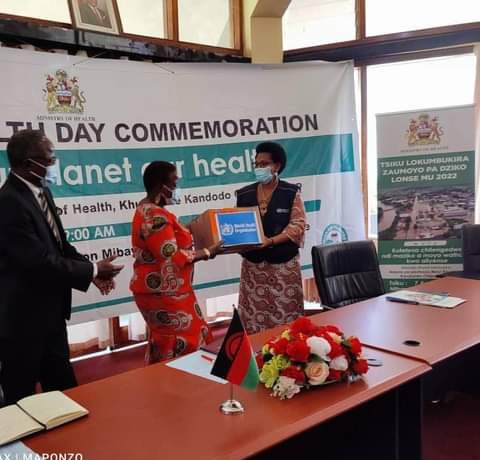BY BLAIR MHONE
Minister of Health Khumbize Kandodo Chiponda today 7th April led the country in commemorating World Health Day by reiterating Malawi’s commitment in building resilient health systems and sustainable low carbon emissions.
The commemorations were held in Lilongwe at the ministry’s offices and also coincided with the official handover of cholera medical supplies by the World Health Organisation (WHO).
The Minister in her speech said in relation to this year’s theme of how the polluted planet has affected humans especially adolescents and women, Malawi has experienced increase in cases of Cholera, Malaria, Cancer, Asthma and Heart disease.
“The issue of polluted environment is one of the major public health concerns. Adaptation to reduce the effects of climate change requires a multi sectoral collaboration to minimize negative health outcomes,” she said.
She added by citing heat waves, extreme coldness drought, tropical cyclones of Ana and Gombe as some of typical examples of how climate change is affecting the health system in Malawi.
“These extreme weather conditions have caused injuries, flooding, damaged water and sanitation facilities, houses, health facilities and disrupted electricity supply,” added the minister.
On this she said strategies to reduce climate change are in place as the Malawi government is committed in implementing resolution made last year at Conference of Parties (COP) number 24 in Glasgow, Scotland.
She also said the ministry wants to take advantage of this year’s World Health Day commemorations to share information, challenges, lessons learnt and to strengthen coordination for implementation of climate change activities to improve health and development.
She said the medical supplies received from the WHO will assist in curbing the outbreak of cholera with 65 cases so far reported in the country leading to the loss of three lives.
Meanwhile WHO Regional Director for Africa Dr. Matshidiso Moeti said climate change is manifesting I’m increasing temperatures, rising sea levels, changing rainfall patterns, and more frequent and severe extreme weather conditions.
According to Moeti, WHO estimates that more than 13 million annual deaths globally are due to avoidable environmental causes, including the climate crisis.
“With direct consequences for the key determinants of health climate change is negatively impacting air and water quality, food security, and human habitat and shelter.
” The knock-on effect for the burden of heart and lung disease, stroke and cancer, among others, is evident from statistics that point to Non Communicable Diseases representing a growing proportion of Africa’s disease burden,” said Moeti in a recorded speech on the commemoration of the day.
World Health Day has been observed annually on 7th April, since 1950, to commemorate the anniversary of the founding of the WHO.
This year’s theme is Our Planet, Our Health.













